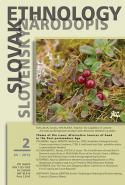The Collection of Questionnaires Concerning Wild Plants on the Digital Platform of the Polish Ethnographic Atlas
The Collection of Questionnaires Concerning Wild Plants on the Digital Platform of the Polish Ethnographic Atlas
Author(s): Agnieszka PieńczakSubject(s): Museology & Heritage Studies, Agriculture, Regional Geography, Environmental Geography, Preservation, Electronic information storage and retrieval, Cultural Anthropology / Ethnology
Published by: SAV - Slovenská akadémia vied - Ústav etnológie a sociálnej antropológie Slovenskej akadémie vied
Keywords: ethnology; Polish Ethnographic Atlas; wild plants; protection and preservation of cultural heritage; digitalization;
Summary/Abstract: The specificity of the Polish Ethnographic Atlas (PEA) research work and the potentialities of applying atlas materials have been largely discussed over the last few years. What should be reminded here is that the research activity of the PEA is based on two mainstays: the documentary one (collecting fieldwork materials, museum and library search) and the interpretative one (elaborating appropriate systematics which take into account various forms and varieties of the investigated phenomena, preparing maps and concluding on the basis of the spatial ethnographic image). The first stage has been already completed – therefore, the Cieszyn Atlas Unit has rich ethnographic archives, the only one of such a size in Poland. The collection comprises several thousand interview questionnaires, surveys, fieldwork photographs and other archival materials, obtained by Polish ethnologists in the second half of the 20th century nearly all over Poland. The second mainstay of the atlas activity concerns the elaboration of the collected source materials in the form of maps and some corresponding commentaries as well as in the form of special electronic catalogs. What the article aims at is presenting the specificity of the Polish Ethnographic Atlas in the context of documentation, preservation and popularization of cultural heritage of the Polish countryside. Source materials of the Atlas constitute a unique source of rural history and, in contrast to other ethnographic studies, they comprise the whole territory of Poland. Arduously collected over the decades, the Atlas sources are a precious part of the material cultural heritage. Presenting and popularizing them is needed e.g. by local communities, which turn to their cultural roots to build their local/regional/national identity. Currently, the Polish Ethnographic Atlas is starting long-term documentary work concerning scientific processing and popularization of source materials essential for conducting and developing the research on the digital platform.
Journal: Slovenský národopis
- Issue Year: 64/2016
- Issue No: 2
- Page Range: 228-240
- Page Count: 13
- Language: English

